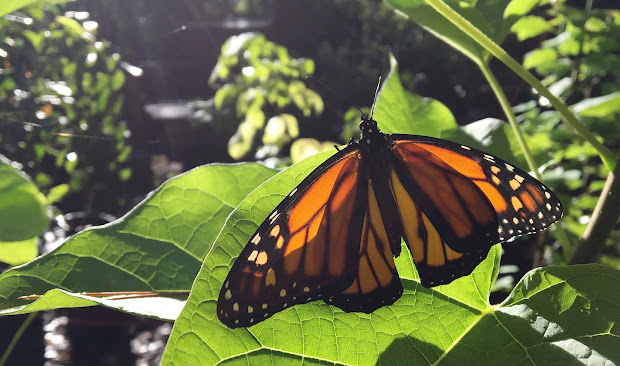"I found my passion here. I wish I had found it and joined earlier" - interview with Tayler Figueroa of Pine Lily Chapter
Tayler Figueroa is the Chapter Representative for the Pine Lily Chapter. She lives in Kissimmee with her husband and two young boys. I interviewed her at her house on January 10, 2019.
VA: When did you become an FNPS member and how did you hear about FNPS?
TF: I started a vegetable garden in the spring, and I noticed there were very few bees in my garden. I started researching how to help the native pollinators, and planting native wildflowers kept coming up. I used FNPS’s plant search and when I saw that you could get discounts on native plants by joining FNPS, I was excited, but I balked at the $35 per month membership fee. I would need to buy a lot of plants, but I thought it would be worth it. I was pleasantly surprised to find that it costs much less to be a member than I thought.
VA: Why do you stay involved with FNPS?
TF: Once you start and you realize what’s at stake… you can’t give in. Wait, let me back up and really answer the questions. Once I was hooked, I realized what my passion was. It’s native plants. I didn’t know it in college, I tried a bunch of things and they weren’t it. The local involvement is really important. You meet the people that area in the chapter and make that personal connection and you feel like you want to help. Even with no ecological/botanical education I still wanted to help in any way I could. I realized how much help Pine Lily needed. I keep involved even though it’s exhausting. I want to teach my kids, too.
VA: How did you get involved in chapter leadership?
TF: I got my [membership] card in the mail and was waiting for something else to happen so I called Karina, Pine Lily’s President, because nobody was calling me. So, I called Admin Services (the main phone number for FNPS) and asked for a local contact, and they gave me her number.
VA: What does Pine Lily Chapter specialize in? What’s your thing?
TF: Pine Lily used to specialize in plant sales, but we’re a small Chapter now so we’re still finding our focus. If it were up to me, I would like to specialize in plant rescues and restoration.
VA: What does your chapter mascot, the pine lily (Lilium catesbaei), mean to you?
TF: It’s significant because it’s both beautiful and threatened. T&E (threatened and endangered) species were my native plant hook. It’s exciting to see a pine lily in the wild.
VA: What are your plans for Pine Lily Chapter for 2019?
TF: You know I’m all about the milkweed propagation. I’m obsessed with milkweed. [note: as we all very well should be] I’m looking for way to make a difference in my county because I grew up here. I didn’t even know we had milkweed in Osceola County and we have rare species like Curtiss’s Milkweed (Asclepias curtissii) here. I want to find them and map them and maybe one day get the opportunity to grow them.
VA: What are your native plant goals for 2019?
TF: I just got my nursery business registered (Velvet Leaf Natives) and I want to increase the availability of natives in Osceola County. I need to keep learning so I know what I want to study in the future.
VA: How has the Florida Native Plant Society made your life better?
TF: I found my passion here. I wish I had found it and joined earlier.
VA: What have you accomplished that you’re proud of within FNPS?
TF: [Tayler initially tries to insist that she hasn’t done anything, then I remind her about the plant rescue that she orchestrated of the State Threatened leafless beaked orchid (Sacoila lanceolata) in Kissimmee] Ok, so I’m pretty proud of organizing my first plant rescue.
Interview by Valerie Anderson, Director of Communication and Programming




Comments